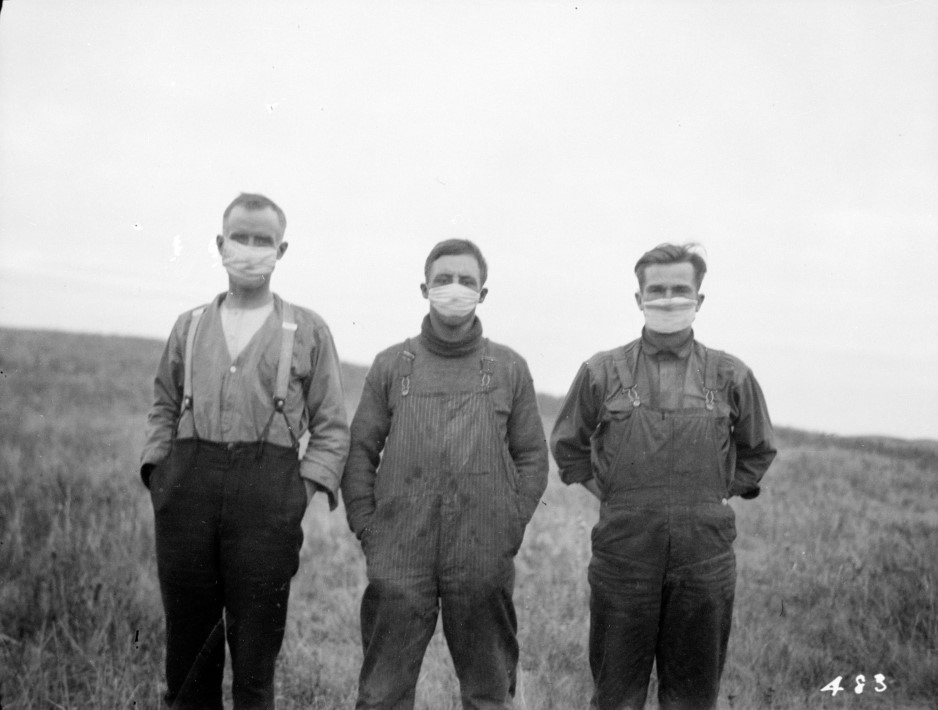
This blog was written by Defining Moments Canada in partnership with ‘Ingenium – Canada’s Science and Technology Museum’, and first appeared on August 30th on the Ingenium website.

PHOTO CREDIT: Courtesy of US National Archives
A nurse protects herself while fetching water, September 13, 1918.
Defining Moments Canada Announces a National Contest to Commemorate the 100th Anniversary of the Spanish Flu Pandemic in Canada 2018-19
– RECOVERING CANADA –
A national contest is challenging schools, museums, and heritage organizations to tell stories about the Spanish flu pandemic using digital storytelling tools.
“We hope to inspire Canadians to bring to light the stories that shaped our country but are only briefly mentioned in textbooks, and often ignore the many diverse voices that need to be heard,” says Neil Orford, program leader for Defining Moments Canada, the bilingual, non-profit heritage organization hosting the contest. “Personal stories from the Spanish flu pandemic are hard to come by — yet they need to be told.”
Defining Moments Canada has created an innovative, new “digital commons” on their platform, where Canadians can find an array of scholarly research, digital assets, educational tools, and data about the pandemic.
“Most importantly, the Defining Moments Canada platform also teaches Canadians how to tell the best stories in the digital age,” explains Orford, who co-founded the organization with Blake Heathcote. “Canadians who engage with the platform can find the most relevant digital story-telling techniques, supported with a rich catalogue of online tutorials, images, tips and lessons for teachers.”
Telephone operators wearing masks, High River, Alberta [ca. 1918-1919].
Contest details are available on the Defining Moments Canada website. Teachers, museums, archives, and heritage groups are encouraged to register for the contest by October 31, 2018. Once registered, users can start to design their best interdisciplinary projects to commemorate the pandemic in their communities.
Working in collaboration with “The Critical thinking Consortium (‘TC2’)”, Defining Moments Canada is providing registrants with an ‘Inquiry Toolkit” – rich array of interdisciplinary lessons, resources and assessment tools for curating and designing your classroom project for success in the Recovering Canada Contest.
“The Defining Moments Canada platform encourages projects that come from multiple perspectives — science, arts, music, history, nutrition, and math — and projects that creatively combine elements of each,” says Orford.
He points to a successful project from a class at Markville Secondary School in Unionville, Ontario. Led by their teacher, Adrienne Chong, the students used Google Cardboard to create their own virtual reality app — which can now be downloaded from Google Play.
“It was amazing to watch this group of students become active learners who were invested in the recounting of the spread of the pandemic, through a manner that was relevant to them — virtual reality,” says Chong, who leads the school’s history department. “The fact that they could share a story of the pandemic in an interdisciplinary manner is the essence of the Defining Moments Canada platform.”
Additionally, teachers are invited to participate in a free PD In-Service workshop at the Archives of Ontario (York University Campus) on November 8th – hosted by Defining Moments Canada, and facilitated by TC2 – to learn how to use the Inquiry Toolkit. Teachers will also get an opportunity to work with new Lesson Kit on the 1918 Pandemic, prepared by the Archives of Ontario. (contact neilorford@canhist.ca for details)
There are thousands of untold stories locked away in local libraries, newspapers and archival collections everywhere in Canada, just waiting to be told, says Orford.
On the Defining Moments Canada platform, there are stories to spark inspiration —such as the story of Kirkina Mucko from Labrador, Canadian War Nurse Blanche-Olive Lavallée from Quebec City, and famed aviator Amelia Earhart from Toronto.
“Using any medium imaginable, Defining Moments Canada wants Canadians to be creative and passionate in how they share these stories,” says Orford, adding that there will be prizes for the best pandemic-based research projects from Canadian communities.
Exactly 100 years ago, the Spanish flu pandemic swept across Canada from September 1918 through late 1919. By the time it was over, more than 50,000 Canadians had died, and likely one third of all Canadians had been afflicted.

PHOTO CREDIT: Courtesy of Library and Archives Canada
Alberta men wearing masks during the Spanish Influenza epidemic, 1918.
“In a stunningly short span of time, the Spanish flu took almost as many Canadian lives as had been lost during the four years of the Great War,” says Orford. “We know that from coast to coast and from every generation, there are fascinating Canadian stories that have never been shared, and certainly never made public in an accessible way — and our aim is to change that.”
Defining Moments Canada was founded with support from with the Ministry of Canadian Heritage and dozens of partner institutions, including the Critical Thinking Consortium, Library and Archives Canada, the Archives of Ontario, the National Microbiology Lab, the Canadian Nurses Association, Huron College (Western University), and Ingenium – Canada’s Museums of Science and Innovation.

